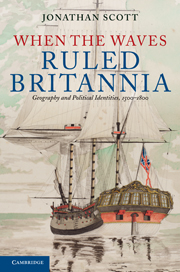Book contents
- Frontmatter
- Contents
- List of figures
- List of maps
- Preface: Geography and the sea
- List of abbreviations
- Introduction: Britain's island idea
- 1 Community of water
- 2 Queen of Sparta
- 3 The discipline of the sea
- 4 Ark of war
- 5 Blowing a dead coal
- 6 The British empire in Europe
- 7 The world in an island
- 8 Anti-continentalism
- 9 What continent?
- Conclusion: floating islands
- Appendix: Duck Language (1724)
- Bibliography
- Index
9 - What continent?
Published online by Cambridge University Press: 05 June 2012
- Frontmatter
- Contents
- List of figures
- List of maps
- Preface: Geography and the sea
- List of abbreviations
- Introduction: Britain's island idea
- 1 Community of water
- 2 Queen of Sparta
- 3 The discipline of the sea
- 4 Ark of war
- 5 Blowing a dead coal
- 6 The British empire in Europe
- 7 The world in an island
- 8 Anti-continentalism
- 9 What continent?
- Conclusion: floating islands
- Appendix: Duck Language (1724)
- Bibliography
- Index
Summary
Spider, clever and fragile, Cook showed how
To spring a trap for islands, turning from planets
His measuring mission, showed what the musket could do,
Made his Christmas goose of the wild gannets.
Still as the collier steered
No continent appeared;
It was something different, something
Nobody counted on.
Allen Curnow, ‘The Unhistoric Story’Recently John Pocock has presented the history of the British empire ‘as that of an archipelago, situated in oceans and expanding across them to the Antipodes’. As partly directed to New Zealanders, this is a useful attempt to remind them that their history, both Polynesian and European, has been part of something much larger and more complex than the nation-state. Yet from the perspective of British history this image of empire appears to depict the outcome of a process of geographical redescription, rather than the process itself.
We have seen Britain define itself as an island nation by contradistinction to ‘continental’ France (or China). We have seen western Europe, and Britain within it, constructed as a maritime alternative to ‘continental’ Asia (and America). We have seen English-speaking Americans claim an insular independence from the affairs of Europe. In this chapter we encounter a maritime redescription (rather than critique) of the British empire. This was an empire not only held together by, but in some sense composed of, water.
- Type
- Chapter
- Information
- When the Waves Ruled BritanniaGeography and Political Identities, 1500–1800, pp. 173 - 193Publisher: Cambridge University PressPrint publication year: 2011



